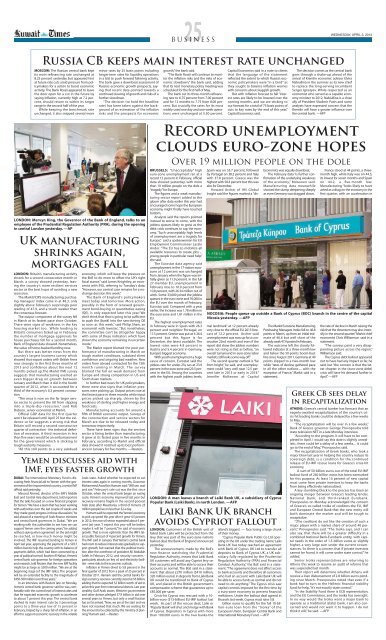KT 3-4-2013_Layout 1 - Kuwait Times
KT 3-4-2013_Layout 1 - Kuwait Times
KT 3-4-2013_Layout 1 - Kuwait Times
Create successful ePaper yourself
Turn your PDF publications into a flip-book with our unique Google optimized e-Paper software.
MOSCOW: The Russian central bank kept<br />
its main refinancing rate unchanged at<br />
8.25 percent yesterday but appeared hint<br />
at future rate cuts amid pressure from policymakers<br />
for a action to boost economic<br />
activity. The Bank Rossii appeared to leave<br />
the door open for a cut in the future by<br />
saying inflation, currently high at 7.2 percent,<br />
should return to within its target<br />
range in the second half of the year.<br />
While keeping the benchmark rate<br />
unchanged, it also snipped several more<br />
minor rates by 25 basis points including<br />
longer-term rates for liquidity operations<br />
in a bid to push forward faltering activity.<br />
The bank gave a downbeat assessment of<br />
Russia’s economic growth prospects, saying<br />
that recent data pointed towards a<br />
continued slowing of growth and risks of a<br />
further slowdown.<br />
“The decision (to hold the headline<br />
rate) has been taken against the background<br />
of an estimation of the inflation<br />
risks and the prospects for economic<br />
BUSINESS<br />
Russia CB keeps main interest rate unchanged<br />
LONDON: Mervyn King, the Governor of the Bank of England, talks to an<br />
employee of the Prudential Regulation Authority (PRA), during the opening<br />
in central London yesterday. —AP<br />
UK manufacturing<br />
shrinks again,<br />
mortgages fall<br />
LONDON: Britain’s manufacturing activity<br />
shrank for a second consecutive month in<br />
March, a survey showed yesterday, leaving<br />
the country’s more resilient services<br />
sector as the best hope of avoiding a new<br />
recession.<br />
The Markit/CIPS manufacturing purchasing<br />
managers’ index came in at 48.3, only<br />
slightly above February’s surprisingly poor<br />
reading of 47.9, and a touch weaker than<br />
the consensus forecast.<br />
The output component of the survey fell<br />
in March at its fastest pace since October.<br />
There were signs of weakness in the key<br />
housing market too. While lending to<br />
Britain’s consumers ticked up in February,<br />
the number of mortgage approvals for<br />
house purchases fell for a second month,<br />
Bank of England data showed. Nonetheless,<br />
the value of home-backed lending rose.<br />
But there was better news from the<br />
country’s largest business survey which<br />
showed that export orders with British firms<br />
rose strongly in the first three months of<br />
<strong>2013</strong> and confidence about the next 12<br />
months picked up.The Markit PMI survey<br />
suggests that manufacturing exerted an<br />
even bigger drag on growth between<br />
January and March than it did in the fourth<br />
quarter of 2012, when it accounted for a<br />
third of the economy’s 0.3 percent contraction.<br />
“The onus is now on the far larger service<br />
sector to prevent the UK from slipping<br />
into a triple-dip recession,” said Rob<br />
Dobson, senior economist at Markit.<br />
Official GDP data for the first quarter<br />
won’t be released until April 25 but the evidence<br />
so far suggests a strong risk that<br />
Britain will record a second consecutive<br />
quarter of contraction - the technical definition<br />
of recession. A third recession in less<br />
than five years would be an embarrassment<br />
for the government which is sticking to<br />
tough austerity measures.<br />
“All this still points to a very subdued<br />
economy, which will keep the pressure on<br />
the BoE to do more to offset the UK’s tight<br />
fiscal stance,” said James Knightley, an economist<br />
with ING, referring to Tuesday’s data.<br />
“However, our central case remains for a nochange<br />
decision this week.”<br />
The Bank of England’s policymakers<br />
meet today and tomorrow. More action,<br />
possibly in the form of renewed government<br />
bond-buying or quantitative easing<br />
(QE), is only expected later this year.“We<br />
don’t think that that is going to be sufficient<br />
to push the (bank) into the sanctioning QE<br />
as soon as this week,” said Philip Shaw, an<br />
economist with Investec. “But nonetheless,<br />
the committee can’t be altogether happy<br />
with some of these indicators which have<br />
shown the economy remaining in uncertain<br />
mode.”<br />
The Markit report blamed the poor performance<br />
of manufacturing in March on<br />
tough market conditions, subdued client<br />
confidence and ongoing bad weather. New<br />
orders from abroad contracted for the 15th<br />
month running in March. The survey<br />
blamed the fall on weak demand from<br />
Europe and strong competition in US and<br />
South Asian markets.<br />
In further bad news for UK policymakers,<br />
there were also signs that inflation pressures<br />
were picking up. Output prices rose at<br />
the fastest pace in three months while input<br />
prices picked up sharply, driven by the<br />
weakness of sterling and higher energy and<br />
food costs.<br />
Manufacturing accounts for around a<br />
fifth of British economic output. Surveys of<br />
the construction and service sectors for<br />
March are due to be released today and<br />
tomorrow respectively.<br />
There have been signs that the services<br />
sector is faring better than manufacturing.<br />
It grew at its fastest pace in five months in<br />
February, according to Markit and official<br />
data showed it notched up its best performance<br />
in January for five months. —Reuters<br />
Yemen discusses aid with<br />
IMF, eyes faster growth<br />
DUBAI: The International Monetary Fund is discussing<br />
fresh financial aid to Yemen with the government<br />
of the impoverished country, a senior IMF<br />
official said yesterday.<br />
Masood Ahmed, director of the IMF’s Middle<br />
East and Central Asia department, told reporters<br />
that the talks focused on a new financial program<br />
for Yemen. “We have a team that has been working<br />
with authorities over the last couple of weeks and<br />
they made good progress in those discussions,” he<br />
said ahead of a meeting of Arab finance ministers<br />
and central bank governors in Dubai. “We are<br />
working with the authorities to see how we can<br />
support Yemen over the coming years,” he added,<br />
without saying when agreement on the aid might<br />
be reached, or how much money might be<br />
involved. The IMF resumed lending to Yemen in<br />
April last year, approving the payment of a $93.7<br />
million loan to help the country with its balance of<br />
payments deficit, which had been worsened by a<br />
year of political turmoil. Ibrahim Al-Nahari, Yemen’s<br />
central bank sub-governor for foreign operations<br />
and research, told Reuters that the new IMF facility<br />
might be as large as $500 million. “We are at the<br />
beginning stage (of the IMF talks). The program<br />
will be an extended facility to the magnitude of<br />
$450-500 million over three years.”<br />
In an interview with Reuters late on Monday,<br />
Yemen’s central bank governor said he was comfortable<br />
with the current level of interest rates and<br />
that he expected economic growth to accelerate<br />
to about 7 percent this year. The central bank<br />
slashed its main interest rate by 3 percentage<br />
points to a three-year low of 15 percent in<br />
February, helped by a sharp fall of inflation, in an<br />
effort to support economic recovery in the volatile<br />
Arab state. Asked whether he expected to cut<br />
interest rates again in coming months, Governor<br />
Mohammed Awad bin Hamam said: “Will see, wait<br />
and see.” February’s rate cut was the first since<br />
October, when the central bank began an easing<br />
cycle. Yemen’s economy improved last year but<br />
recovery remains fragile in the second-poorest<br />
Arab state after Mauritania; a third of Yemen’s 25<br />
million people live on less than $2 a day.<br />
Hamam said he expected the Yemeni economy<br />
to pick up speed this year after it grew 4.5 percent<br />
in 2012; the non-oil sector expanded about 6 percent<br />
last year. “I expect this year will be better,<br />
maybe it will be 7 percent,” he said of economic<br />
growth. That is more optimistic than the IMF’s latest<br />
public forecast of 4 percent growth for Yemen.<br />
The IMF said in January that Yemen’s central bank<br />
had room to reduce interest rates gradually to support<br />
growth, but warned that the political transition<br />
after the overthrow of president Ali Abdullah<br />
Saleh in February 2012, and security concerns -<br />
particularly attacks on key oil and electricity facilities<br />
- were risks to the economic outlook.<br />
Inflation in Yemen dived to 5.8 percent in the<br />
final quarter of 2012 from a peak of 25 percent in<br />
October 2011. Hamam said the central bank’s foreign<br />
currency reserves currently stood at $6 billion,<br />
adding that he expected $2 billion worth of aid to<br />
arrive this year from international donors. Last year<br />
wealthy Gulf Arab states, Western governments<br />
and other donors pledged $7.9 billion in aid over<br />
several years to Yemen, but only a small fraction<br />
has so far arrived. “Now, we are at the start and we<br />
have not received that much. We are waiting for<br />
the amount to be collected by the ministry of planning,”<br />
Hamam said. —Reuters<br />
growth,” the bank said.<br />
“The Bank Rossii will continue to monitor<br />
the inflation risks and the risks of economic<br />
slowdown,” the bank said, adding<br />
that its next monetary policy meeting was<br />
scheduled for the first half of May.<br />
The bank cut its three-month refinancing<br />
rate to 6.75 percent from 7.00 percent<br />
and for 12 months to 7.75 from 8.00 percent.<br />
But crucially the rates for its most<br />
widely-used one day and one week operations<br />
were unchanged at 5.50 percent.<br />
BRUSSELS: “Unacceptably” high<br />
euro-zone unemployment ran at a<br />
record 12 percent in February, official<br />
data showed yesterday, with more<br />
than 19 million people on the dole a<br />
“tragedy” for Europe.<br />
The figures and a weak manufacturing<br />
sector report added to the<br />
gloom after data earlier this year had<br />
encouraged some hope the European<br />
economy might finally have touched<br />
bottom.<br />
Analysts said the reports pointed<br />
instead to worse to come, with the<br />
jobless queues likely to grow as the<br />
debt crisis continues to sap the economy.<br />
“Such unacceptably high levels<br />
of unemployment are a tragedy for<br />
Europe,” said a spokeswoman for EU<br />
Employment Commissioner Laszlo<br />
Andor. “The EU has to mobilize all<br />
available resources to create jobs ...<br />
young people in particular need help,”<br />
she said.<br />
The Eurostat data agency said<br />
unemployment in the 17-nation eurozone<br />
at 12 percent was unchanged<br />
from January when the figure was initially<br />
given as 11.9 percent. In the full<br />
27-member EU, unemployment in<br />
February rose to 10.9 percent from<br />
10.8 percent, with 26.34 million out of<br />
work. Some 33,000 joined the jobless<br />
queues in the euro-zone and 76,000 in<br />
the EU over the month of February,<br />
Eurostat said. Compared with a year<br />
earlier, the increase was 1.78 million in<br />
the euro-zone and 1.81 million in the<br />
EU.<br />
The highest unemployment rates<br />
in February were in Spain with 26.3<br />
percent and neighbor Portugal, on<br />
17.5 percent. Greece was put at it 26.4<br />
percent but this figure is for<br />
December, the latest available. The<br />
lowest rates were 4.8 percent in<br />
Austria and 5.4 percent in Germany,<br />
Europe’s biggest economy.<br />
With youth unemployment a huge<br />
cause of concern, Eurostat said the<br />
jobless rate for under-25s ran at 23.9<br />
percent in the euro-zone and 23.5 percent<br />
in the EU. Among the countries<br />
with the highest youth jobless levels,<br />
Capital Economics said in a note to clients<br />
that the language of the statement<br />
reflected the extent to which Russia’s economic<br />
policymakers were “in a bind” as<br />
they sought to balance inflation worries<br />
with concerns about sluggish growth.<br />
But with inflation forecast to fall “interest<br />
rates are likely to be lowered over the<br />
coming months, and we are sticking to<br />
our forecast for a total of 75 basis points of<br />
cuts to key rates by the end of this year,”<br />
Capital Economics said.<br />
Spain was on 55.7 percent, followed<br />
by Portugal on 38.2 percent and Italy<br />
with 37.8 percent. Greece was the<br />
highest with 58.4 percent but this was<br />
also for December.<br />
Howard Archer of IHS Global<br />
Insight said the figures marked a “dis-<br />
mal landmark” at 12 percent-already<br />
very close to the official EU <strong>2013</strong> forecast<br />
of 12.2 percent. Archer said<br />
unemployment was now up for a consecutive<br />
22nd month and even if the<br />
report did show the jobless numbers<br />
were not rising as fast as before, “an<br />
overall turnaround in euro-zone labor<br />
markets still looks some way off.”<br />
The second quarter outlook is “far<br />
from bright,” he said, and unemployment<br />
could “very well near 12.5 percent<br />
late in <strong>2013</strong> or early in 2014.”<br />
Jennifer McKeown at Capital<br />
Economics was equally downbeat.<br />
The February data “is further confirmation<br />
of the underlying weakness<br />
of the economy,” Mckeown said.<br />
Manufacturing data meanwhile<br />
showed the slump deepening sharply<br />
as even Germany was dragged down.<br />
The Markit Eurozone Manufacturing<br />
Purchasing Managers Index fell to 46.8<br />
points in March, up from an initial estimate<br />
of 46.6 but well short of the<br />
already weak 47.9 posted in February.<br />
The outcome left the closely followed<br />
indicator at a three-month low<br />
and below the 50-points boom-bust<br />
line since August 2011. Germany at 49<br />
points slipped to a two-month low<br />
while “rates of decline gathered pace<br />
in all the other nations ... with the<br />
exception of France,” Markit said in a<br />
statement.<br />
WEDNESDAY, APRIL 3, <strong>2013</strong><br />
The decision comes as the central bank<br />
goes through a shake-up ahead of the<br />
arrival of Kremlin economic advisor Elvira<br />
Nabiullina in the summer as its new chief<br />
to replace the long-serving incumbent<br />
Sergei Ignatyev. While respected as an<br />
economist who served as a capable economy<br />
minister to 2012, Nabiullina is a close<br />
ally of President Vladimir Putin and some<br />
analysts have expressed concern that the<br />
Kremlin will have a greater influence over<br />
the central bank. —AFP<br />
Record unemployment<br />
clouds euro-zone hopes<br />
Over 19 million people on the dole<br />
France stood at 44 points, a threemonth<br />
high, while Italy was on 44.5,<br />
its lowest for seven months and Spain<br />
on 44.2, a five-month low.<br />
Manufacturing “looks likely to have<br />
acted as a drag on the economy in the<br />
first quarter, with an acceleration in<br />
NOCOSIA: People queue up outside a Bank of Cyprus (BOC) branch in the centre of the capital<br />
Nicosia yesterday. —AFP<br />
LONDON: A man leaves a branch of Laiki Bank UK, a subsidiary of Cyprus<br />
Popular Bank (Laiki Bank), in north London. —AFP<br />
Laiki Bank UK branch<br />
avoids Cypriot fallout<br />
LONDON: Customers of the British unit of<br />
failed bank Laiki will be protected from the<br />
levy that was part of the euro-zone nation’s<br />
bailout deal, the Bank of England announced<br />
yesterday.<br />
The announcement, made by the BoE’s<br />
new finance watchdog the Prudential<br />
Regulation Authority, means that Laiki Bank<br />
UK customers will avoid any Cypriot levy on<br />
their accounts and will be able to access their<br />
accounts as normal. The BoE said in a statement<br />
that about £270 million ($410 million,<br />
320 million euros) in deposits from Laiki Bank<br />
UK would be transferred to Bank of Cyprus<br />
UK, and placed in the British government’s<br />
compensation scheme that guarantees up to<br />
£85,000 per saver.<br />
Crisis-hit Cyprus was rescued with a 10billion-euro<br />
($13-billion) EU-IMF bailout last<br />
week. As part of the rescue deal, Laiki or<br />
‘Popular Bank’ will shut and merge with Bank<br />
of Cyprus. Depositors in Cyprus with more<br />
than 100,000 euros in the two banks-the<br />
island’s biggest — face losing a large chunk<br />
of their money.<br />
“Cyprus Popular Bank Public Co Ltd operating<br />
in the UK under the trading name ‘Laiki<br />
Bank UK’ has today reached an agreement<br />
with Bank of Cyprus UK Ltd to transfer all<br />
deposits to Bank of Cyprus UK, a UK subsidiary<br />
fully regulated by the Prudential<br />
Regulation Authority (PRA) and Financial<br />
Conduct Authority,” the BoE said in a statement.<br />
“The agreement does not affect access<br />
to bank accounts and therefore all customers<br />
who had an account with Laiki Bank UK will<br />
be able to access funds as normal and do not<br />
need to do anything.” The Cyprus crisis saw<br />
capital controls imposed for the first time by<br />
a euro-zone economy to prevent financial<br />
meltdown. Under the bailout deal agreed in<br />
Brussels last week, Cyprus must raise 5.8<br />
billion euros to qualify for the full 10-billion-euro<br />
loan from the “troika” of the<br />
European Union, European Central Bank and<br />
International Monetary Fund. —AFP<br />
the rate of decline in March raising the<br />
risk that the downturn may also intensify<br />
in the second quarter,” Markit chief<br />
economist Chris Williamson said in a<br />
statement.<br />
“The surveys paint a very disappointing<br />
picture across the region,”<br />
Williamson said.<br />
The Cyprus debt bailout appeared<br />
not to have had any impact so far, he<br />
said, but “the concern is that the latest<br />
chapter in the (euro-zone debt)<br />
crisis will have hit demand further in<br />
April.” —AFP<br />
Greek CB sees delay<br />
in recapitalization<br />
ATHENS: Greece’s central banker has forecast that an<br />
eagerly-awaited recapitalization of the country’s crisis-hit<br />
leading banks could be delayed by a few weeks<br />
to May.<br />
“The recapitalization will be over in a few weeks,”<br />
Bank of Greece governor George Provopoulos told<br />
state television NET in a late Monday interview.<br />
“According to the program, it will have to be completed<br />
in April. I would say this date is slightly unrealistic,<br />
there could be a delay of a few weeks... it could<br />
go to the end of May,” Provopoulos said.<br />
The recapitalization of Greek banks, who took a<br />
major blow last year in helping the country reduce its<br />
sovereign debt, is a condition for the continued<br />
release of EU-IMF rescue loans for Greece’s crisis-hit<br />
economy.<br />
A sum of 50 billion euros out of the total EU-IMF<br />
bailout fund of 240 billion euros has been earmarked<br />
for this purpose. At least 10 percent of new capital<br />
must come from private investors to keep the banks<br />
from being effectively nationalized.<br />
A key stumbling block to the process has been an<br />
ongoing merger between Greece’s leading lender,<br />
National Bank, and third-ranked Eurobank.<br />
Provopoulos on Monday acknowledged the concern<br />
of Greece’s so-called troika of creditors-the EU, IMF<br />
and European Central Bank-that the new entity will<br />
both dominate the market and will be tough to<br />
recapitalize.<br />
“(The creditors) do not like the creation of such a<br />
major player with a market share of around 40 percent,”<br />
Provopoulos said. “The troika says, and I can<br />
also say, that there will be a greater difficulty in a<br />
combined National Bank-Eurobank entity, with capital<br />
needs in the order of 1.5 billion euros or slightly<br />
higher, a very large sum under the current circumstances.<br />
So there is a concern that if private investors<br />
cannot be found, it will come under state control,” he<br />
added.<br />
Senior troika representatives are returning to<br />
Athens this week to resume an audit of reforms that<br />
was suspended last month.<br />
Their report will determine whether Athens will<br />
receive a loan disbursement of 2.8 billion euros pending<br />
since March. Provopoulos noted that even if a<br />
bank had to turn to the Hellenic financial stability<br />
fund for help, “it’s not exactly state control.”<br />
“In the Stability Fund there is ECB representation,<br />
and the EU Commission, and the troika has oversight.<br />
In no way would the troika want a major bank to<br />
operate as a traditional (state) bank. I am also concerned<br />
and would not want it to happen. I do not<br />
think it will,” he said. —AFP
















